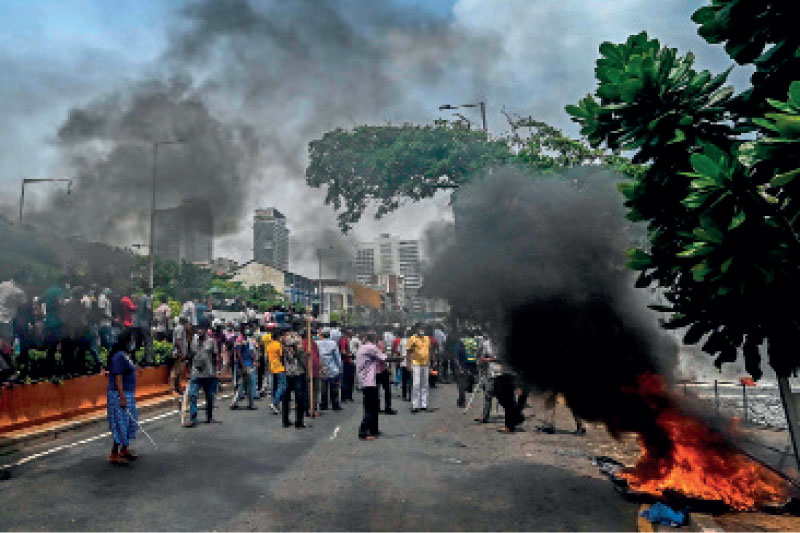Friday Feb 20, 2026
Friday Feb 20, 2026
Thursday, 12 May 2022 01:20 - - {{hitsCtrl.values.hits}}

Will they see the opportunity of redeeming themselves in the changes that are bound to follow if Sri Lanka is to rise from the ashes?
 At the time of writing this article Sri Lanka is without a functioning government. There is no Prime Minister or cabinet and therefore most operations cease in the absence of ministerial approval. Public budgets cannot be approved. No foreign trade or imports can take place. The nation lies in economic ruin. The suffering masses are on the streets protesting in anguish at the prospect of a human catastrophe unfolding. The futures of an entire generation of young and youth lie in tatters. Escalating poverty will significantly lower the standard of living. Food riots are likely to occur in the near future. The country is fast tracking towards anarchy.
At the time of writing this article Sri Lanka is without a functioning government. There is no Prime Minister or cabinet and therefore most operations cease in the absence of ministerial approval. Public budgets cannot be approved. No foreign trade or imports can take place. The nation lies in economic ruin. The suffering masses are on the streets protesting in anguish at the prospect of a human catastrophe unfolding. The futures of an entire generation of young and youth lie in tatters. Escalating poverty will significantly lower the standard of living. Food riots are likely to occur in the near future. The country is fast tracking towards anarchy.
The mountain of debt seems insurmountable. It has built over a period of time. The numbers speak for themselves – the debt stack stood at $ 52 billion at the point at which the wheels began to fall off a month or so ago. However, against this liability the other side of the equation quite does not stack up. Where were these dollars spent? There appears to be an unexplainable reconciling difference. Theories, rumours and fake news abound in explaining the gap. The truth is embedded in a web of deceit and sleight of hand.
The fact is the national coffers are now empty – be it the foreign exchange bucket or the rupee bucket. Fortunately, there is still paper and ink to print enough local currency to meet domestic ongoing Government commitments on a day-to-day basis – only if some form of interim administration can be put in place. Meeting the basic needs for human survival – electricity, gas, petrol, diesel, medications and food staples require foreign currency and that safe is bare too. Sri Lanka is leading a hand-to-mouth existence depending on opportunistic countries responding to the outstretched begging bowl that is adding further to the debt pile. How did it come to this?
Sri Lanka prides itself in the calibre of its accountants and has a very strong professional chartered accounting body. In addition, the country also boasts qualified accountants of prestigious global accounting bodies – although their numbers would be less in the public sector. Accountants are not merely number crunchers keeping track of the financials of the public service and government entities but also the custodians of good governance. They are also the keepers of public trust. There has to be deep soul searching among the collective Sri Lankan accounting profession wondering where they failed in their duty of oversight and good governance. The common persons on the street are justified in their view that the accountants have betrayed the public trust. After all it was the accountants who presided over the Enron debacle with auditors Arthur Andersen looking over their shoulders but turning a blind eye to the wrought and deceit that went on. The collapse of Sri Lanka is a similar situation.
While the root cause could be traced fairly and squarely to the machinations of the leaders of the nation and the politicians, uneducated ministers who refused to follow advice and quack economists who tried radical and failed economic theories it cannot be denied that an accountant of note appears to have chartered the course of the shipwreck. Other accountants oversaw the public finances of the bloated government departments delivering public services and the equally inefficient and loss-making State-owned enterprises. They abandoned the principles of good financial and performance management. Such number crunchers presided over the draining of public finances. These observations may sound harsh. Perhaps some of them stood by their ethics and did the right thing only to be ignored or over ruled by superiors. Such accountants must now put their hand up and come clean.
Private sector finance professionals are not without blemish either. Many of them saw the opportunity of making hay while the sun shone. They gleefully indulged in acts such as facilitating payments in order to expedite processes to the benefit of their organisations. These seemingly innocuous actions over the years established and supported a culture of graft and corruption resulting in Sri Lanka occupying the rank of one of the most corrupt nations in the world. Many private sector CEOs who come from an accounting background too saw fit to cheer on the circus clowns from the side lines – all with the ulterior motive of improving their bottom lines. Photo opportunities and positions on various State-sponsored organisations satisfied egos and personal wellbeing. And so the caravan moved on despite the barking dogs.
And what about the country’s audit profession – also made up of accounting professionals. While the accountants within public sector organisations and SOEs may or may not have been influenced by ulterior motives or senior directives to obfuscate matters financial the auditors should have exercised their independent rigour in ensuring that the truth and nothing but the truth was presented. They owed it to the people of Sri Lanka – if not to the ‘crown’. It appears they have failed miserably in their role as keepers of public trust. The various public inquiries undertaken by the Committee on Public Enterprise (COPE) to ensure the compliance of financial discipline in public corporations and other semi government bodies in which the Government has a financial stake has found that the standards of such financial discipline falls far short of expectations.
Over the last several years and particularly relating to the massive loan-related infrastructure projects that have been carried out in the country what has been the role of the Auditor General? In Australia for example the Auditor General ensures the proper financial disciplines are adhered to in all major projects – not just in the context of transactional accuracy but also in aspects of benchmarking, value for money outcomes and project management disciplines. Were such processes done?
Finance professionals must also certainly be on the boards of various public sector organisations including SOEs. In such roles at the highest organisational level finance professionals have the duty and responsibility to act with honesty and integrity in contributing to the governance and risk management of such organisations. Best practice governance also requires directors to ensure that their organisations adhere to international regulations in respect of aspects such as anti-money-laundering. Directors are required to be trained in these areas.
How will the country’s accounting profession ever be able to hold its head up high again? How does this all reflect on the country’s premier accounting body? What role did they play – or did not in their fiduciary capacity? Have accountants lived up to the high ethical standards required of professional accountants? Has damage has been done to the brand of the Sri Lankan accountant as it actively looks to promote itself as a BPO destination?
Therefore, it begs the question – where are the accountants in all the ruin and rubble? Will they see the opportunity of redeeming themselves in the changes that are bound to follow if Sri Lanka is to rise from the ashes?
(The writer is a Fellow of the Chartered Institute of Management Accountants UK and was the first Global President of the Institute of Sri Lankan origin. This is his personal opinion and does not reflect the view of any organisation.)